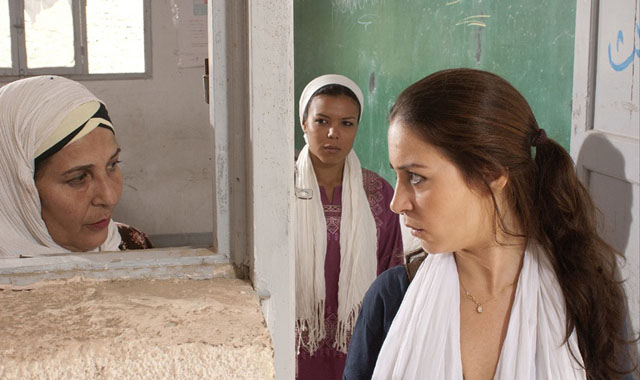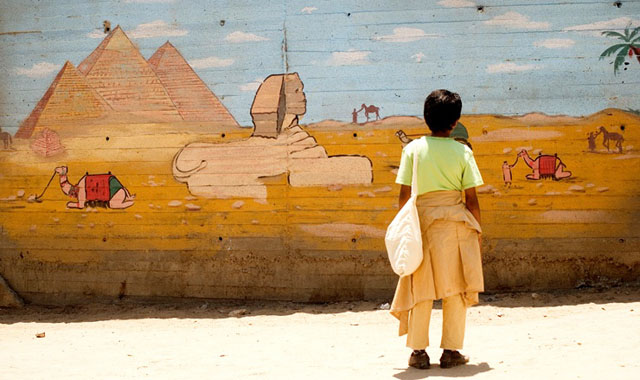Daniel Kasman, editor of MUBI’s Notebook, has landed in Cannes, and the first film he’s caught is, according to Robert Koehler, “the first work in the competition that doesn’t belong there.” We’ll get to that, but first, Danny finds in Egyptian director Yousry Nasrallah’s After the Battle a “stable heft of construction and deep understanding of genre conventions and a digital, realist mise-en-scène [that] allows it to move unexpectedly and considerable complexity between engagement with mainstream melodramatic storytelling and integrating, sometimes fluidly, often abruptly, poetic observations and dubiously dramatic, but forceful, socio-political discussions…. In a way, Nasrallah is positing a very dynamic, challenging but accessible form of mainstream political cinematic storytelling—a goal intrinsically experimental. The film is thus an admirably active, thinking film, energetic and versatile, and altogether working on a level of intelligent, agile and unafraid engagement that is a terrific way to start the 2012 festival.”
But for Robert Koehler, writing for Doug Cummings’s newly revived Film Journey (hurrah!), “After the Battle hammers its messages home. Since those messages are about Egypt’s semi-revolution after Tahrir Square, they could be welcome and interesting. But he chooses to couch them in a poorly conceived tale with flatly drawn characters meant to represent their classes…. Much of After the Battle plays like a Ken Loach movie—as if we need two Ken Loach movies in the competition—and which may partly explain why it’s here.”
Blake Williams for Ioncinema: “Characters weak and empowered alike have argument after argument over seemingly every social issue in Egypt as it relates to the Mubarek regime’s influence, a fundamental flaw in the script that reduces what should be living, breathing humans into non-descript participants in what resembles the world’s most disorganized debate tournament. When someone does engage in an aspect of life that could be considered banal, it’s quickly escalated to an nth degree of tension and screaming, as if Nasrallah were worried his audience was getting bored with it. Just narratively disjointed enough to be certifiably unconventional, there is little to justify this bloated work’s existence other than the obvious historical source that spawned it.”
“It takes a special kind of dud to make the immediacy of the Arab Spring seem trite and spineless, especially since the ripples from that massive uprising still reverberate throughout the Middle East,” writes Glenn Heath Jr. at Press Play. “But that’s exactly what After the Battle achieves.”
The Hollywood Reporter‘s Deborah Young admires the film’s “intelligence and passionate boldness.” The set-up: “The impetuous Rim (Meena Chalaby) goes with her friend Dina (Jordanian actress Phaedra) to distribute fodder to hungry horses in the ancient village of Nazlet, in the shadow of the Pyramids. Now that the tourists who once hired them have disappeared, the horsemen are so poor they can no longer afford to feed their mounts. Here she meets the strapping, guileless rider Mahmoud (Bassem Samra) and they exchange a forbidden kiss in the night. Their promised affair fizzles, without completely dying out, when Rim discovers he has a family and tries to educate the lot to participate in the revolution. Tahrir Square has forever changed their lives, though not for the better, because Mahmoud was pulled off his horse while attacking the demonstrators and beaten. A video of his humiliation is on You Tube, for which his sons are mocked and beaten in school. His spirited young wife Fatma (Nahed El Sebai) just wants things to return to normal.”
“After the Battle finally reaches an enthralling representation of community activism with its climactic scene, set at an actual protest—but by then it’s too late to enliven the overall experience.” Eric Kohn at indieWIRE: “To be fair, Nasrallah faces a tough proposition from the outset, when one considers the challenge of developing any kind of cogent story around the impact of the Egyptian uprising (or the Arab Spring at large), as it remains in the midst of great change but has yet to prove that true change has in fact taken place. That sense of ambiguity is exactly why ½ Revolution and Tahrir contained such stunning immediacy and “After the Battle” fails to make the drama stick: Nasrallah never brings the same intensity to the fiery topic that its heroine regards with such extreme convictions.”
More from Drew McWeeny (HitFix) and Jay Weissberg (behind Variety‘s paywall).
Updates: “After the revolution, Egyptian filmmakers were divided,” writes Domenico La Porta at Cineuropa. “Should they urgently report what their country had just lived through or, rather, was it better to wait for sufficient distance from the events that had so marked Egyptian culture and politics? Yousry Nasrallah threw himself into shooting, reportedly for up to six months, as political events in Egypt continued to unfold. After the Battle evolved as a consequence of these, and at times you can feel this in the film’s uneven pace. The film, edited from 8 hours of rushes, soon developed from a Romeo and Juliet at the foot of the pyramids into a story with very different issues at stake. Even the first four-hour edit continued to change as a result of the constant flux of political events. After the Maspero massacre last October (during which 28 protesters were killed in front of state television headquarters), Nasrallah opted for a fatal, but nevertheless open ending to his film. This climatic ending is no doubt the most beautiful moment of the film, which was screened in Cannes just five days before the Egyptian presidential elections, before the next battle.”
The Guardian‘s Xan Brooks agrees that the “last shot is dynamite: a poetic crawl up the edge of a pyramid, rising in agonizing, mesmerizing degrees with seemingly no end in sight. The rest, however, is but a long, hard trudge.”
At the AV Club, Mike D’Angelo finds After the Battle to be “politically astute, noting the way in which confused young men who were manipulated by Mubarak into attacking protestors wound up becoming convenient scapegoats. But Nasrallah’s hackneyed sense of dramaturgy and non-existent camera sense haven’t changed since I endured his El Medina (The City) over a decade ago.”
“The trouble with After the Battle is that it feels like every idea and experience related to the Arab Spring in Egypt has been thrown into the one pot,” writes Dave Calhoun for Time Out London. “The film was devised without a script, over the middle months of 2011, and it shows. Some of the acting is hysterical. Much of it is poor. There are too many stereotypes: the young, female, modern divorcee; the unreconstructed, simple and uneducated male; the pantomime villain community leader. The film feels like both a too-basic allegory of the country’s wider woes and a story far too steeped in barely comprehensible detail.”
“Sections dealing with the role of women in this turbulent era in Egypt recall the more impactful and tightly focused Cairo 678,” notes Fionnuala Halligan in Screen, “although the juxtaposition of the wall built in Nazret to keep the villagers away from the pyramids with the Cairo protests and Rim’s urban lifestyle is strong.”
The Playlist‘s Kevin Jagernauth finds that the “blending of actual footage with well-staged scenes is seamless, which adds a palpable level of authenticity to the proceedings, but it isn’t enough to save the messy and manipulative film.”
Updates, 5/19: “I don’t usually allow a heart being in the right place to excuse over-simplified characters and contrived confrontations,” writes Nick Roddick for Sight & Sound. “But After the Battle is such a useful corrective to the romanticisation of the Egyptian revolution that forgiveness is easy.” At Little White Lies, David Jenkins asks, “was there really not a single film on the entire African continent that was not deemed more worthy [of the Competition] than this?” More from Guy Lodge (In Contention, D+) and Michal Oleszczyk (Hammer to Nail, “tiresome”).
Cannes 2012 Index: a guide to the coverage of the coverage. For news and tips throughout the day every day, follow @KeyframeDaily on Twitter and/or the RSS feed.





